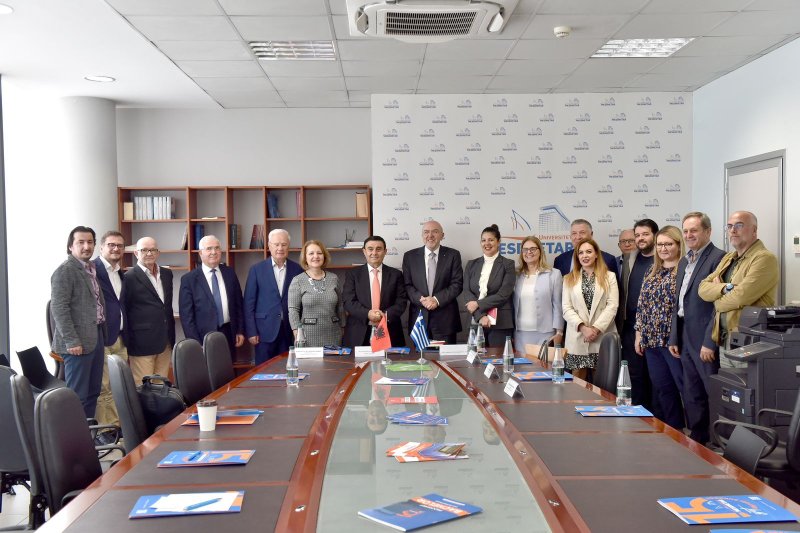Closer to a Europe-oriented Albania
The President of the Mediterranean University of Albania, Academic Prof. Dr. Anastas Angjeli, received a visit from the Deputy Foreign Minister for Economic Diplomacy of the Republic of Greece, Mr. Kostas Fragkogiannis, accompanied by the Ambassador of the Republic of Greece in Albania, Mrs. Konstantina Kamitsi.
During the meeting, assessments were made, and opinions were exchanged about the level of relations and economic and commercial cooperation in the fields of education and technological developments, along with their future perspectives. Following this, Mr. Fragkogiannis delivered an open lecture attended by professors and students of the Mediterranean University. Prof. Anastas Angjeli, in his speech, welcomed Mr. Fragkogiannis and thanked him for his efforts to further strengthen relations between the two countries, particularly in business, scientific research, innovation, and new technologies.
In his lecture, Mr. Fragkogiannis focused on the strong cultural foundations of the relations between the two countries, using two examples that illustrate the cultural closeness between the two peoples. He referenced the myth of the Arta Bridge and the story of Rozafa Castle, which contain many similarities, emphasizing that our societies share a common past based on sacrifice, as well as a present and future of mutual interest. “We as politicians must not be confined by the present; instead, through our present actions and initiatives, we must envision and prepare the future,” he stressed.
He noted the importance of further strengthening good neighborly relations, citing the initiative that Greece and Turkey have undertaken to establish a Positive Agenda between their countries. This initiative focuses on identifying areas of common interest while keeping communication channels open, even during politically tense periods. He suggested that this model could be valuable for relations between Greece and Albania.
This was the reason for his official visit to Albania, during which meetings were held at the ministerial level, and the process of identifying concrete areas of cooperation began—areas that will be further elaborated by the representative commissions of both countries.
Mr. Fragkogiannis summarized the measures taken over the years by the Greek governments to overcome the economic crisis and pointed out the achievements of the Greek economy, which has been experiencing satisfactory growth rates in recent years, not only in traditional areas such as tourism and shipping but also in the fields of information technology, innovation, and renewable energies. Through this growth, the deputy minister said, Greece aims at increasing its economic presence in an Europe-oriented Albania, and reaching levels of cooperation comparable to before the economic crisis.
His speech aroused the interest of those present, who asked him a series of questions regarding economic cooperation between the two countries, collaboration in scientific research and innovation, the integration process, and positive examples from Greece regarding the brain drain, a very current problem for Albania.
"Just like Albania, Greece has also experienced different types of mass migrations," said the deputy minister. "The first waves were departures for survival, like those after the Second World War, which, unfortunately, did not bring peace to Greece but rather another war: the civil war. Later departures were those of specialists and educated individuals. Many Greek graduates have returned recently, especially in the field of technology, after leaving during the economic crisis. They are now offered salaries comparable to what they received abroad, and in addition to that, they are in their homeland."
At the end of this very pleasant conversation, Professor Anastas Angjeli presented Mr. Fragkogiannis with a medal of appreciation on behalf of the Mediterranean University. / ADN













